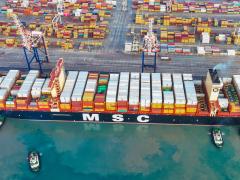Freight forwarders have been warned about the dangers of placing false confidence in shipping documents issued by overseas agents which do not absolve the freight forwarder of risk should anything go wrong with the cargo or the transaction.
Shepstone & Wylie attorney Edmund Greiner, speaking at the law firm’s recent inaugural Maritime Summit in Durban, said freight forwarders were under the mistaken impression that if a foreign agent issued a bill of lading for the imported cargo then the freight forwarder would automatically be absolved of risk.
However, he said this was not always so, and highlighted cases where freight forwarders had faced financial risk and insurance woes when things went wrong. He said it was important to ensure terms Relying on overseas agents for cover is risky business and conditions were spelled out to customers at the time of concluding a contract, which should be more than just a disclaimer at the bottom of an email.
“If you don’t contract in terms of your standard trading conditions, if you have paid for insurance, they won’t pay out your claim,” he said.
Greiner said freight forwarders had to be clear on documents whether they were acting as a principal – which would mean they would be responsible if something went wrong – or as an agent, in which case the customer would be responsible if something went wrong.
He said that while terms and conditions were printed on the back of the bill of lading, it did not always serve as the contract, which was concluded long before goods were shipped.
Greiner said in one case a freight forwarder had arranged shipment of television sets from China, mistakenly believing that if his agent’s bill of lading was issued to import the goods to South Africa there was no risk to him.
Unfortunately, when the television sets arrived damaged, the freight forwarder’s lawyer questioned the document saying that his client had not contracted with the foreign agent.
“My customer had to pay out for the TV sets. He could not rely on the Chinese bill of lading and he could not get paid out by his underwriter because he did not contract in terms of standard trading conditions,” Greiner said.
“It seems people like to use the Chinese bill of lading,” he said. In another case, a consignment of cosmetics arrived in South Africa, but the freight forwarder’s client had decided he did not need the goods and left them in storage for a year.
“Every month the shipping line would send a bill for detention and demurrage and it was over a million rand,” Greiner said.
The freight forwarder contacted him nine months down the line for advice and it turned out that he had also used his Chinese agent’s bill of lading which left him liable for costs – and his insurance would not pay out.
“My client had to go to the shipping line, who was understanding and gave him a reduced cost, but he was not able to recover that from his customer because he had not paid attention to the contractual nature and had not made sure the contract was in place,” he said.
INSERT AND CAPTION
It’s important to ensure terms and conditions are spelled out to customers at the time of concluding a contract. – Edmund Greiner












